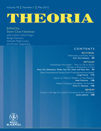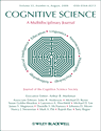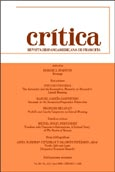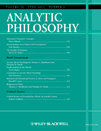
Constructivist Foundations
Scope & Guideline
Advancing Interdisciplinary Insights in Learning and Cognition
Introduction
Aims and Scopes
- Interdisciplinary Constructivism:
The journal emphasizes a constructivist perspective that integrates insights from diverse fields such as cognitive science, philosophy, and education, allowing for a richer understanding of human cognition and learning. - Language and Cognition:
There is a strong focus on the relationship between language and cognition, exploring how language shapes human experience and social interaction, and how these processes can be understood through a constructivist lens. - Autopoiesis and Systems Theory:
Many articles investigate the concept of autopoiesis and its implications for understanding living systems, cognition, and social processes, contributing to a systems theory approach that emphasizes self-organization. - Enactivism and Embodiment:
The journal regularly features research that explores enactivism, which posits that cognition arises through a dynamic interaction between an organism and its environment, highlighting the embodied nature of learning and knowledge. - Critical Perspectives on Education:
There is a consistent focus on educational practices and theories, particularly how constructivism can inform teaching methodologies, learning environments, and curriculum development. - Philosophical Underpinnings of Constructivism:
The journal delves into the philosophical roots of constructivism, examining key figures and concepts that have shaped the constructivist discourse, including discussions of realism, epistemology, and ontology.
Trending and Emerging
- Cancel Culture and Social Dynamics:
The journal has seen an increase in papers addressing the implications of cancel culture, exploring its relationship with language, social media, and public discourse, reflecting contemporary societal challenges. - Neurophenomenology and First-Person Methodologies:
There is a growing interest in neurophenomenology and first-person approaches, emphasizing the importance of subjective experience in understanding cognition and learning, which aligns with constructivist principles. - Ecolinguistics and Environmental Concerns:
Emerging themes in ecolinguistics indicate a rising concern for ecological issues, examining how language and discourse shape our understanding of environmental challenges and sustainability. - Critical Cybernetics and Systems Thinking:
Recent trends show an increasing focus on critical cybernetics and systems thinking, emphasizing the interconnectedness of systems in understanding cognition, society, and education. - Embodied and Enactive Learning:
There is a notable trend towards research on embodied and enactive learning, which reflects a shift away from traditional cognitive theories towards understanding learning as a dynamic interaction between the learner and their environment.
Declining or Waning
- Traditional Cognitive Psychology:
There seems to be a waning interest in traditional cognitive psychology approaches that do not align with constructivist or enactivist perspectives, as more emphasis is placed on relational and embodied cognition. - Static Learning Models:
Research focusing on static or behaviorist models of learning appears to be less prevalent, as the journal increasingly prioritizes dynamic and contextualized approaches to understanding learning processes. - Individual-Centric Theories:
The focus on individual cognition, separate from social and environmental contexts, is declining, with a growing emphasis on relational and systemic understandings of cognition. - Reductionist Approaches:
There is a noticeable decrease in reductionist approaches that simplify complex cognitive processes, as the journal favors more integrative and holistic perspectives. - Methodological Rigor in Isolation:
There seems to be less emphasis on rigid methodological frameworks that do not account for the complexities of human experience, as the journal promotes more flexible, context-sensitive research methodologies.
Similar Journals

Review of Philosophy and Psychology
Exploring the Depths of Thought and MindReview of Philosophy and Psychology, published by Springer, stands as a pivotal journal at the intersection of two influential disciplines. Operating under the ISSN 1878-5158, this esteemed publication has garnered attention since its inception in 2010, with a clear commitment to advancing the discourse in both Experimental and Cognitive Psychology and Philosophy. Notably, it has achieved impressive rankings in 2023, placing in the Q2 category for Experimental and Cognitive Psychology and Q1 category for Philosophy, further enhancing its credibility and appeal among scholars. With a notable Scopus ranking of #26 in Philosophy and #40 in Experimental Psychology, the Review of Philosophy and Psychology serves as an essential platform for the dissemination of research that equips readers with multifaceted insights and fosters interdisciplinary dialogue. While the journal maintains traditional access options, it continues to contribute significantly to its fields with high-quality articles that challenge and expand existing paradigms. As such, it is an invaluable resource for researchers, professionals, and students eager to explore and understand the nuanced relationships between philosophical inquiry and psychological research.

Journal for General Philosophy of Science
Connecting Ideas in the Philosophy of Science and BeyondJournal for General Philosophy of Science, published by Springer, stands as a pivotal resource in the fields of History and Philosophy of Science, as well as general Philosophy. With an impressive Q1 ranking in its categories and a solid reputation reflected in its Scopus rankings, this journal provides a robust platform for scholarly discourse and advancement in philosophical inquiry regarding science. The journal's commitment to quality is evident, catering to researchers, professionals, and students interested in the critical examination of scientific methods, theories, and their implications. While it operates on a subscription basis, the journal is dedicated to fostering a deeper understanding of philosophical issues surrounding scientific practices from 1980 through 2024. Operating out of the picturesque Netherlands, specifically from VAN GODEWIJCKSTRAAT 30, 3311 GZ DORDRECHT, the journal continues to encourage innovative thinking and interdisciplinary dialogue, underscoring its significance in academia today.

Theoria-A Swedish Journal of Philosophy
Fostering Critical Thought and Innovative PerspectivesTheoria - A Swedish Journal of Philosophy, published by WILEY, stands as a significant contributor to the realm of philosophical discourse since its inception in 1935, with a continued commitment to advancing scholarly conversation up to 2024. With its ISSN 0040-5825 and E-ISSN 1755-2567, the journal holds a prestigious position in the field, ranking in Q2 among philosophy journals and achieving an impressive 66th percentile ranking in the Scopus Arts and Humanities category. Although it does not currently provide Open Access options, Theoria remains a vital resource for researchers, professionals, and students seeking in-depth analyses and innovative perspectives within contemporary philosophy. Its central objective is to foster rigorous academic dialogue that explores diverse philosophical inquiries, making it an essential platform for those invested in the pursuit of knowledge and critical thought.

COGNITIVE SCIENCE
Charting New Territories in Human ThoughtCOGNITIVE SCIENCE, published by WILEY, is a leading academic journal that delves into the complexities of human cognition through an interdisciplinary lens. With an ISSN of 0364-0213 and an E-ISSN of 1551-6709, this journal has made significant strides in the field since its inception in 1977, ample coverage through to 2024, and a commendable Q1 and Q2 categorization in Experimental and Cognitive Psychology and Cognitive Neuroscience as of 2023. The journal is positioned at the intersection of various disciplines, ranking #65 out of 165 in Experimental and Cognitive Psychology and #58 out of 115 in Cognitive Neuroscience, highlighting its relevance and contribution to advancing knowledge in these areas. Although it does not offer open access, COGNITIVE SCIENCE remains an essential resource for researchers, professionals, and students seeking to explore groundbreaking research and theoretical insights within the vast domain of cognitive science.

CRITICA-REVISTA HISPANOAMERICANA DE FILOSOFIA
Connecting Scholars, Inspiring IdeasCRITICA-REVISTA HISPANOAMERICANA DE FILOSOFIA, published by CRITICA in Mexico, is a prominent peer-reviewed journal established in 1977 that has continually contributed to the field of philosophy in the Hispanic world. With an ISSN of 0011-1503 and an E-ISSN of 1870-4905, this journal plays a significant role in disseminating philosophical discourse, engaging both established and emerging scholars. It holds a Q3 ranking in the field of Philosophy according to the 2023 Category Quartiles and is ranked 305 out of 806 in the Scopus Arts and Humanities: Philosophy category, placing it in the 62nd percentile. Although it does not offer an open access option, its commitment to quality and relevance makes it an essential resource for researchers and students eager to explore contemporary philosophical issues and debates. The journal remains a vital platform for intellectual exchange, encouraging diverse perspectives that enrich the landscape of philosophical inquiry.

Organon F
Advancing the frontiers of philosophical thought since 2002.Organon F is a distinguished open-access journal dedicated to the advancement of philosophical discourse and inquiry. Published collaboratively by the Institute of Philosophy of the Slovak Academy of Sciences and the Institute of Philosophy of the Czech Academy of Sciences, this journal promotes innovative and critical approaches to a wide range of philosophical topics. With its establishment in 2002 and continuous commitment to academic rigor, Organon F has rapidly ascended through the ranks, currently holding a Q2 classification in the field of Philosophy according to the Scopus database, ranking 279 out of 806 journals with a commendable 65th percentile standing. The journal is pivotal in fostering interdisciplinary dialogue and serving as a reliable source of scholarly research, making it an essential resource for researchers, professionals, and students alike. Its open-access format since 2010 ensures that cutting-edge philosophical insights are readily available to a global audience, empowering the academic community to engage with and contribute to ongoing debates in contemporary philosophy.

ERKENNTNIS
Cultivating critical perspectives in logic and philosophy.ERKENNTNIS, published by SPRINGER, is a premier academic journal that has been advancing the study of philosophy and logic since its inception in 1919. With its esteemed ranking in the Q1 quartile for both categories as of 2023, it stands at the forefront of scholarly discourse, earning an impressive rank of #104 in the field of philosophy and #13 in logic according to the Scopus rankings. This influential publication not only contributes to the theoretical underpinnings of these disciplines but also fosters a vibrant exchange of ideas among researchers, professionals, and students alike. While it does not offer open access to its articles, the journal's esteemed reputation and rigorous peer-review process ensure that all published works maintain the highest standards of quality and intellectual inquiry, making ERKENNTNIS an essential resource for anyone engaged in these critical areas of study.

PHILOSOPHY OF SCIENCE
Bridging History and Philosophy for Scientific AdvancementPHILOSOPHY OF SCIENCE, published by Cambridge University Press, serves as a premier journal at the intersection of history, philosophy, and science, making significant contributions to our understanding of scientific inquiry and its historical contexts. With an impressive impact factor reflected in its 2023 Category Quartiles—ranking Q1 in History, Q1 in History and Philosophy of Science, and Q1 in Philosophy—this journal stands out as a vital resource for researchers, professionals, and students alike. Operating without Open Access, it encourages the dissemination of groundbreaking ideas from 1949 through 2024, illustrated by its robust Scopus rankings, including a remarkable 98th percentile in the History category. Based in the United Kingdom at the prestigious Cambridge campus, PHILOSOPHY OF SCIENCE is committed to fostering scholarly dialogue and advancing critical thought in the philosophy of science.

Analytic Philosophy
Exploring the Depths of Analytic Thought and MethodologyAnalytic Philosophy is a prestigious journal published by Wiley, dedicated to advancing critical discourse in the realm of philosophy. With an ISSN of 2153-9596 and an E-ISSN of 2153-960X, this journal has rapidly established itself as a vital resource for researchers, professionals, and students seeking to explore contemporary philosophical debates and analytic methods. Operating from the heart of the United States, located at 111 River St, Hoboken, NJ, it holds an impressive Q1 classification in the field of philosophy for 2023, ranking #190 out of 806 within Scopus's Arts and Humanities category, placing it in the top 76th percentile. The journal’s commitment to rigor and innovation makes it an essential platform for thought-provoking research and discussions in analytic philosophy. Researchers will appreciate the journal’s high standards and its significant impact within the academic community.

JOURNAL OF PHILOSOPHY
Pioneering new perspectives on timeless questions.The Journal of Philosophy, with ISSN 0022-362X and E-ISSN 1939-8549, is a premier academic publication in the field of philosophy, published by J Philosophy Inc. Located in the United States at Columbia University, 709 Philosophy Hall, New York, NY 10027, this esteemed journal serves as a critical platform for rigorous scholarly discourse and innovative research. With a commendable Impact Factor and ranked in the top Q1 category for Philosophy in 2023, the journal holds a prominent position within the academic community, attracting contributions that push the boundaries of philosophical inquiry. The Journal of Philosophy has consistently ranked in the 91st percentile in the Scopus Arts and Humanities rankings (Rank #65/806), underscoring its influence and the relevance of its published works. Though it operates on a subscription model, the journal’s extensive back-catalog and current issues provide invaluable resources for researchers, professionals, and students alike, promoting a deeper understanding of philosophical concepts and stimulating meaningful discussions in contemporary thought.